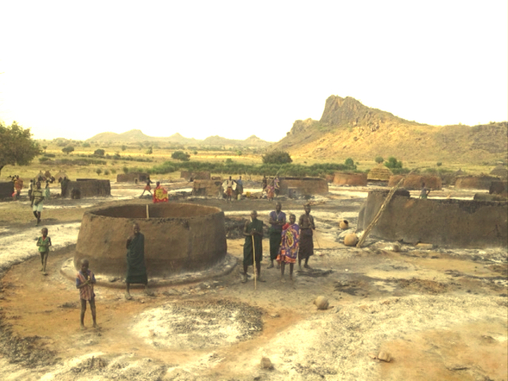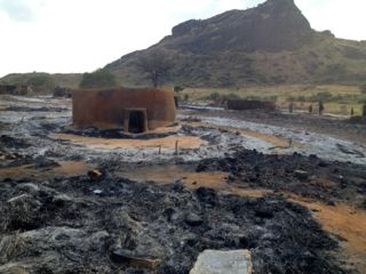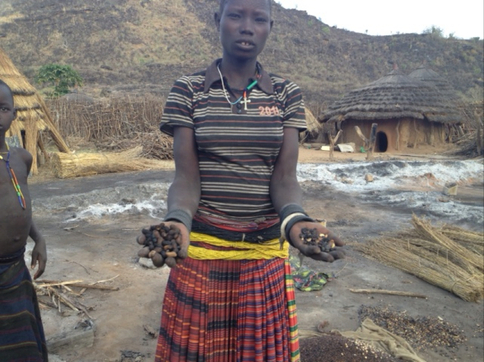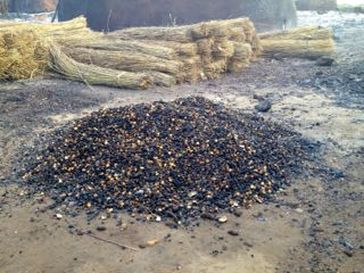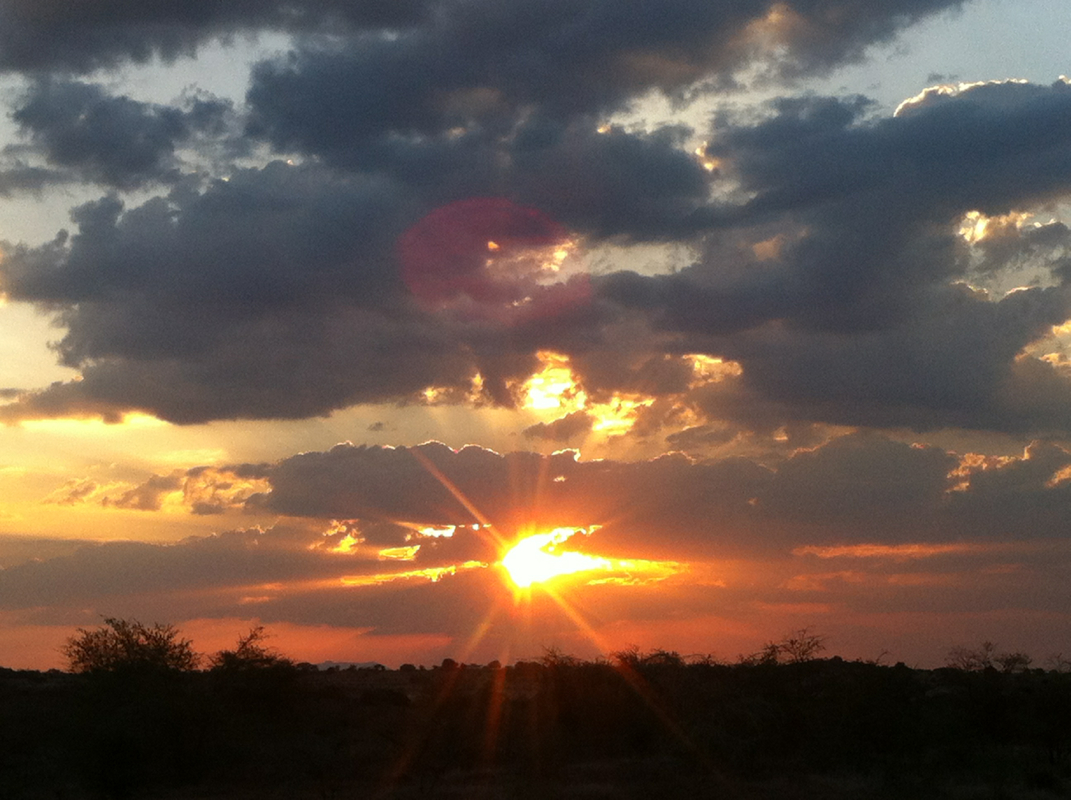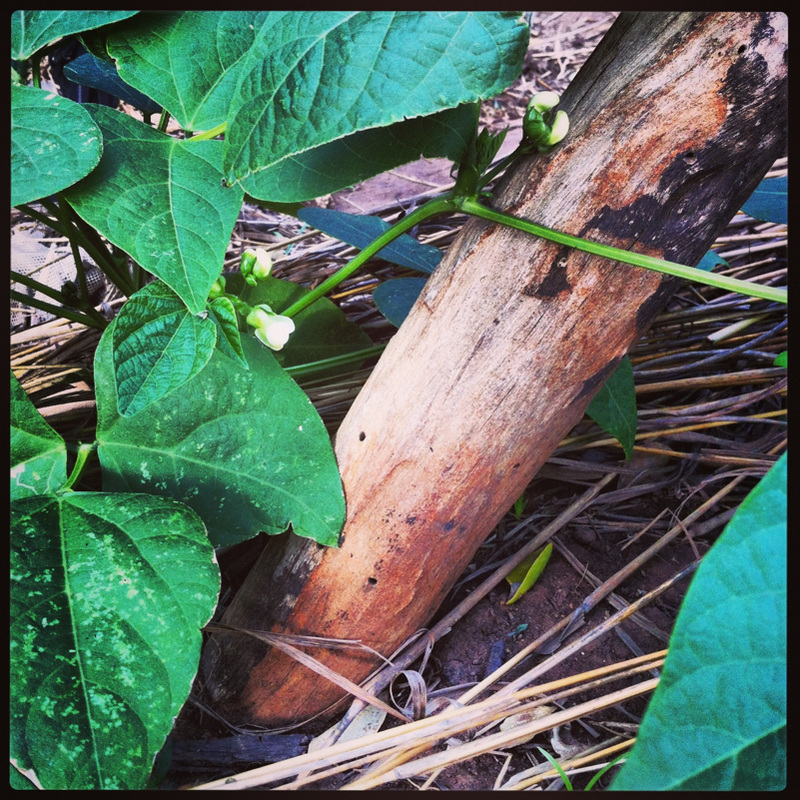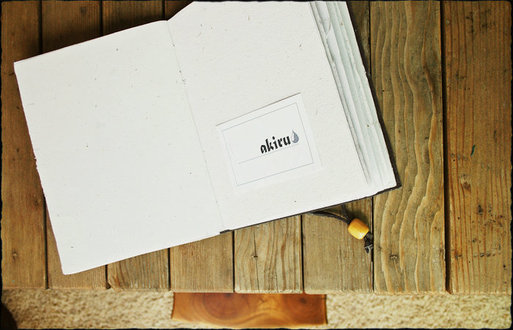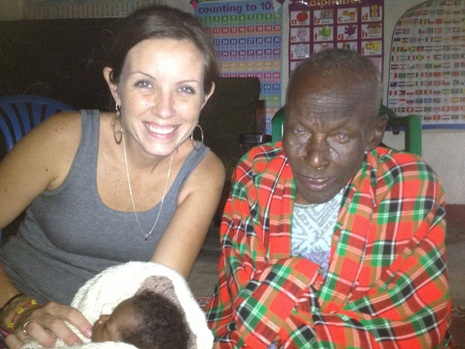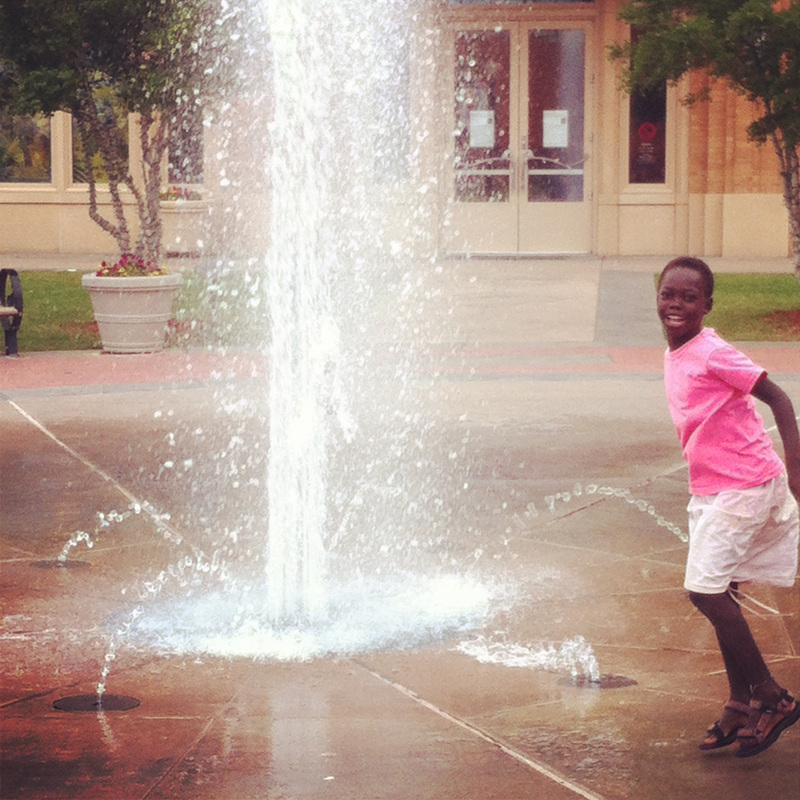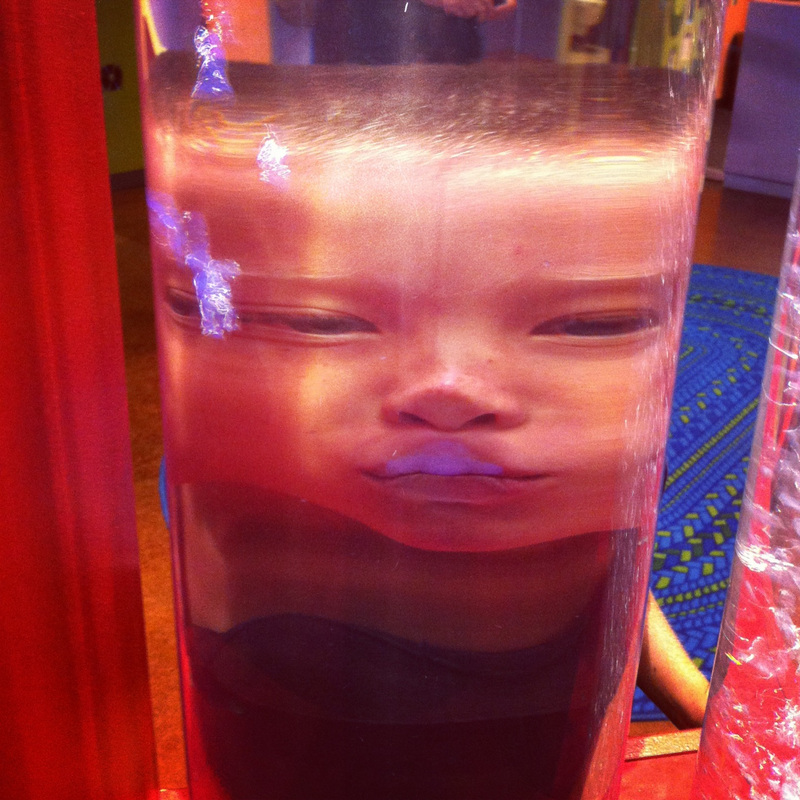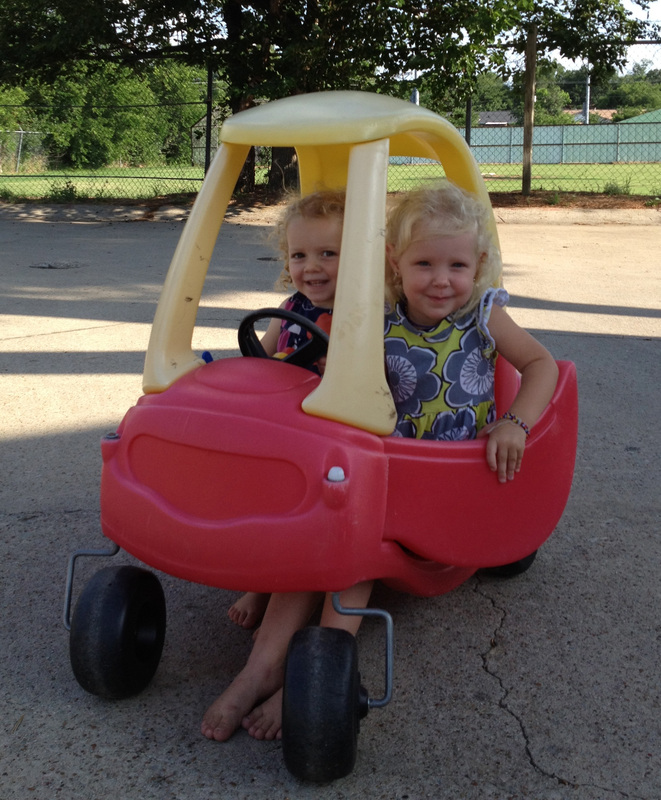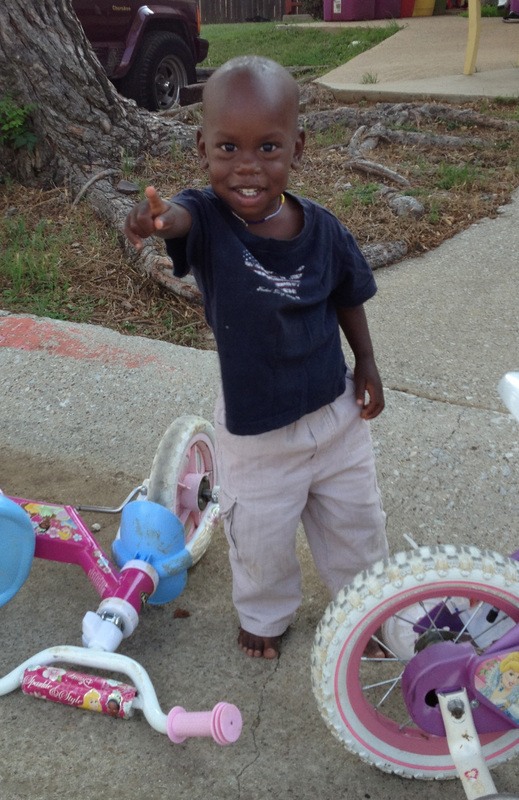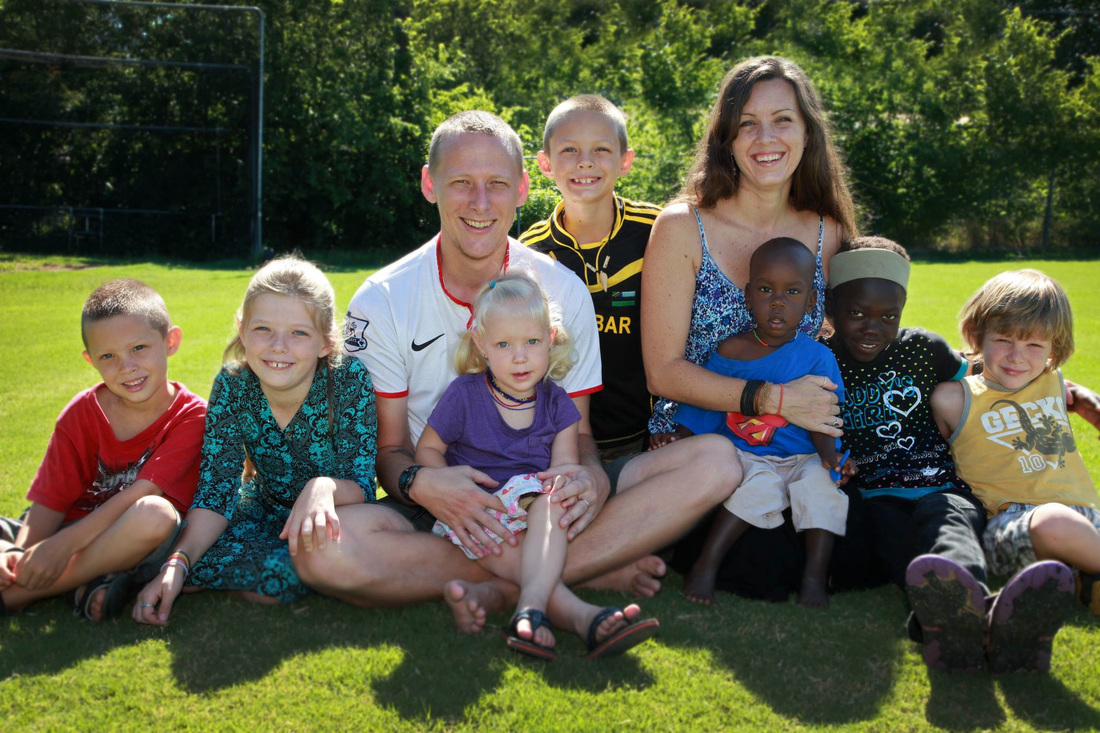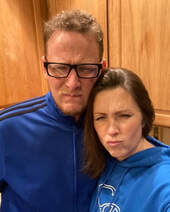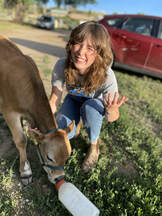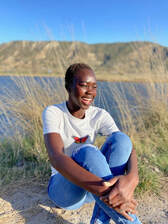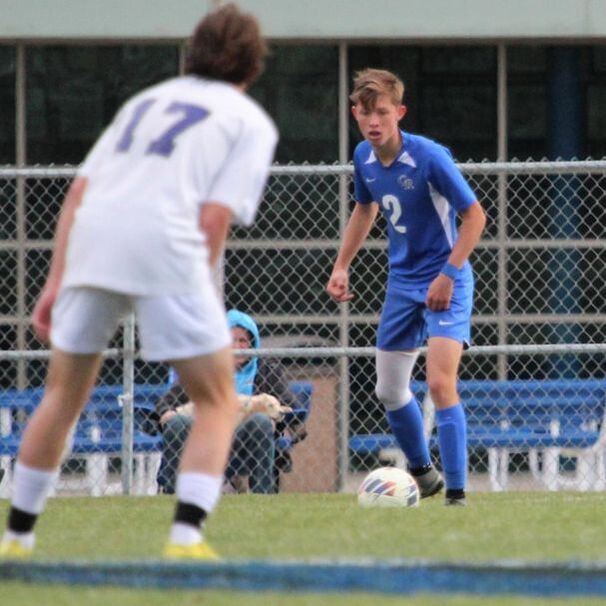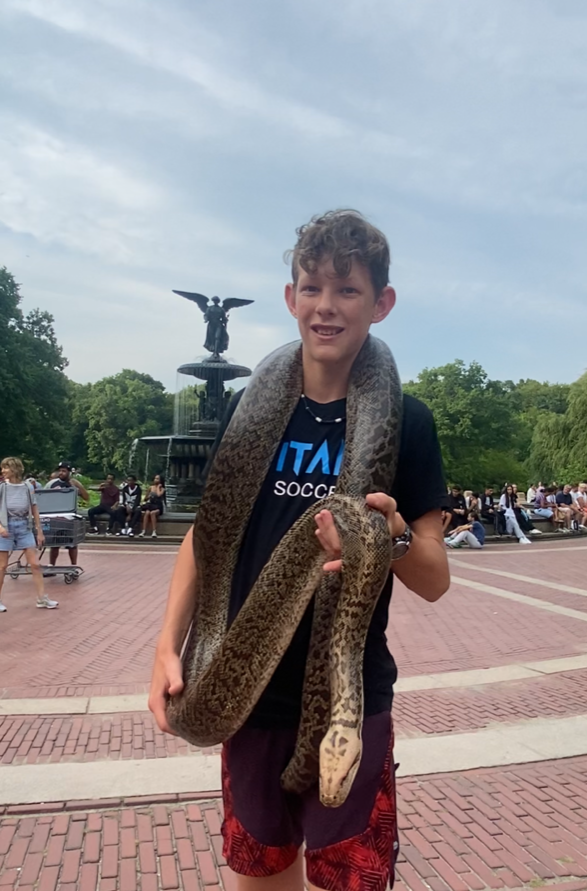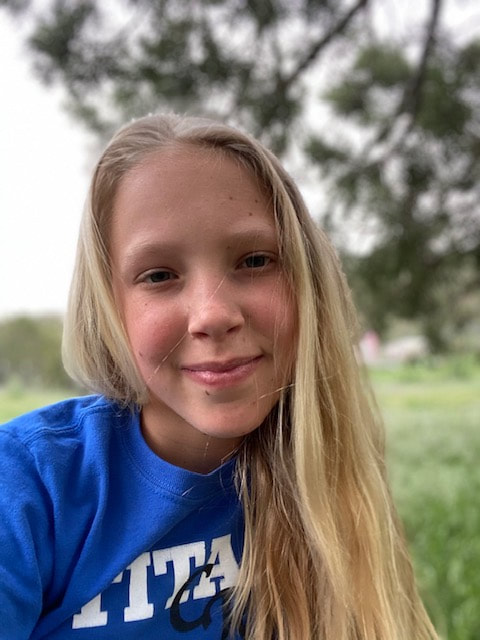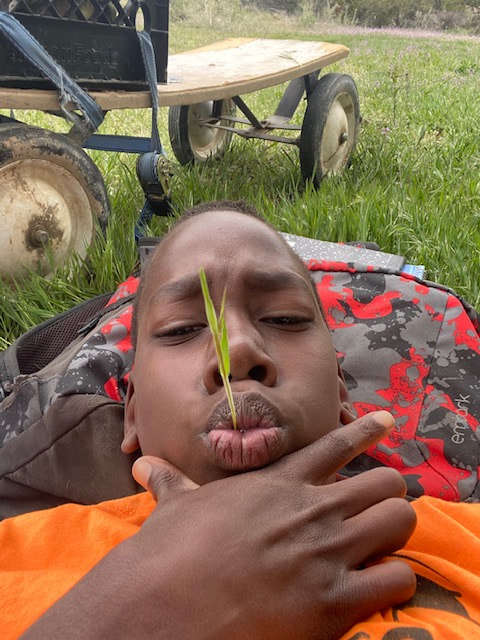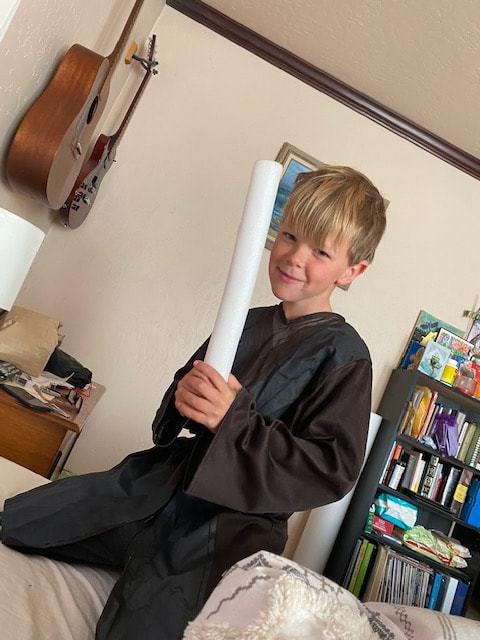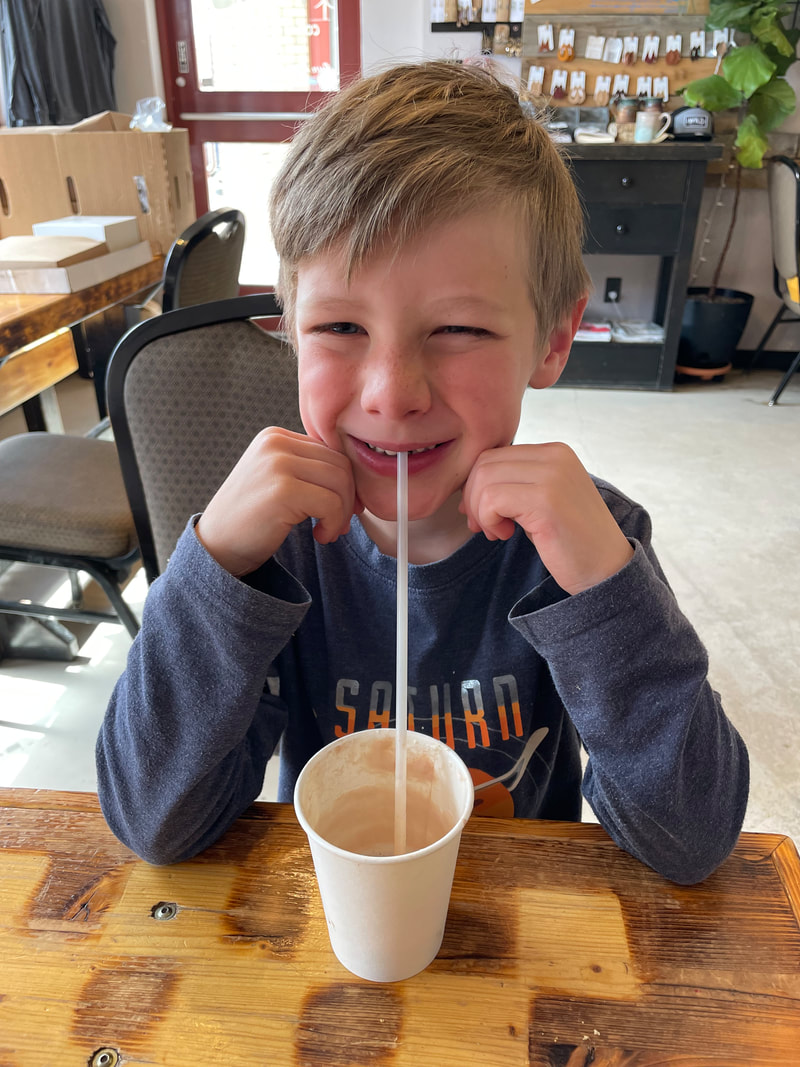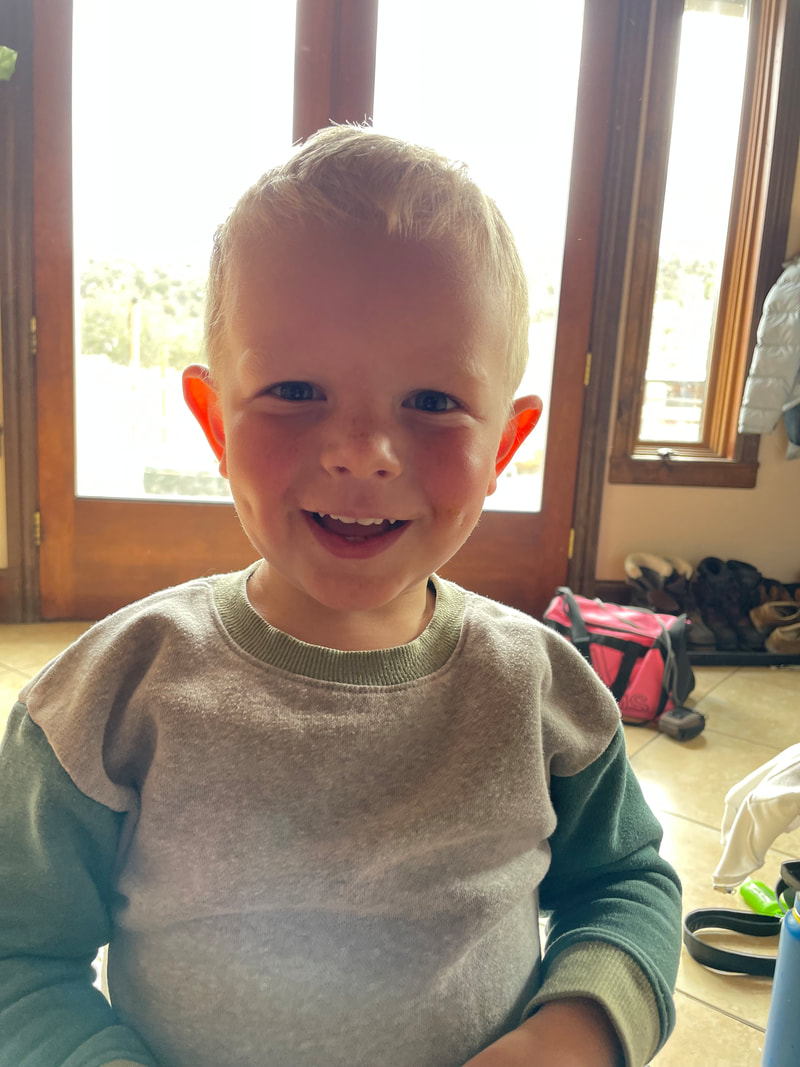|
The sound of crackling woke me up this morning. It was too close and too loud for comfort. We gathered beside Elise and Camille's hut and watched the flames lick at the dry sorghum stalks just outside our fence. As the shepherds beat at the flames with branches the fire slowly died down, leaving only blackened earth in its wake.
It's fire season around here. As the snow falls back in our home state we who live among the Karimojong watch our grass yellow and wither away. The land as far as I can see is hazy with dust and smoke and patches of black stretch to the right and left, little ribbons of trail still winding, white and bare, through the ash. This week a fire got out of control. It came on the wind, they say, little tornadoes of flames that flew from hut to hut and fence to fence, destroying everything it touched. In the end 32 families are left with nothing, bare ground, bare walls and burnt circles all that's left of their homes. Their stores of food, meant to last until harvest season in the fall, are black and charred. This kind of disaster in our country brings out the best in us as people and as fellow Americans. We give generously and take trips to help with clean-up and disaster relief. We take people into our homes, if needed, and gather donations of blankets and clothes. We give, give and give more. After all, they are our friends and neighbors. But what about disaster in a place like this? A place where neighbors don't have enough for their own families, much less those whose food is now black with ash. A place where people own only one blanket, if that, or one pot, or one set of clothes. How do they help? They'll try, I know, but there is not enough to go around. The families who lost everything are sleeping outside on the burnt ground as they beg for help. They are grinding their charred sorghum and maize and cooking it, anything to fill their empty bellies. And so today, because these people are now our neighbors and friends, we beg you, our neighbors and friends across the water, for help. We have never done relief work on any scale, but this time we feel compelled to try and help. Maybe help will come from organizations here, eventually, but they can't wait. We are planning to bring a truck from a neighboring town with bags of sorghum or maize, blankets, cooking pots, jerry cans and basins for each family. This is barely scratching the surface of the need, but it's a start, a start that leaves room for our local community to help as well. So please, if you are willing, give! There is a donate button on the right side of our blog if that's the easiest way for you to help, but make sure to email us at williamsinthewilderness@gmail.com and let us know that money is designated for fire relief. Otherwise, checks can be sent to: Advance Him P.O. Box 65147 San Antonio, TX 78265 Please add a note (NOT on the check) with our name on it. Thank you in advance for your help! We are always amazed by the support we feel from our friends and family back at home. Please join us in praying for these families as they struggle to rebuild their homes and their lives.
1 Comment
It had been one of those needy kind of days. The kind where I am a milkshake and everyone has their straws in me, sucking for all they're worth (thanks to Rachel Jankovic's book, Fit to Burst, for this very accurate description of my life!). Today it was money for school fees for my daughter, one lady asked, and a ride from town because it is so far to walk, said another, and medicine because my baby is very, very sick, said my friend who walks on her hands, and food because there is nothing for the children to eat, said still another, and work because we have no hope left at all. And the needs were so valid, but all I could hear in my head was that slurping sound of straws scraping the bottom of my glass, searching for any last taste. Slurp, slurp. I was empty. That day on the other side of the globe my grandmother was being buried, a funeral I never meant to miss. And our Akiru meeting had been rough. Conflict, arguments, raised voices and hurt feelings, they all came out, but nothing was solved. And honestly, isn't it time for me to stop being so tired and sick every day? I don't remember pregnancy being so hard. And my list of errands was longer than my daily allotment of endurance. My own needs were sucking me dry. How could I possibly have anything left for anyone else? And so we fought our way through the day, my patience hanging by a thread, and finally started for home. Bumpy roads have a way of clearing your head, making you more contemplative, and for the first time that day we slowed down and just soaked it all in. The sunset, the cows, the shepherds and their sticks, the simplicity and beauty of life. And slowly I began to remember. My life was overwhelming, no doubt about that. But it was also beautiful and blessed. I had forgotten that this life that I was called to, this life that I had chosen, was one of joy. Joy in the journey, joy in the sacrifice, joy in joining my Father in laying down my life. Not that it was easy and not even that His yoke always felt light, but if I was called to "count it all joy" then maybe I needed a perspective shift. My heart had lost its way and in the process had run dry. I thought back to the woman asking me for money for school for just one child while the others all sit out, waiting for the hope of a sponsor next year, and I was so grateful to be able to teach my children at home. I thought about the woman who needed a ride, who would more than likely be walking the 26 miles to my village, her baby tied on her back, and I was so grateful for my dependable truck. I thought about the woman whose baby was sick, who would crawl all the way to town on her hands, her two year old daughter on her back, just to beg for help, and I was so grateful for healthy children and for easy access to medicine. I thought about this same woman begging me for food, her small pile of holey leaves all that she had to feed her seven children, and I was so grateful for nutritious food, for the ability to choose what we feel like eating on any given day. I thought about the woman needing work, her husband, disabled, and her children left with nothing, and I was so grateful for the freedom we have to work here, unhindered and without worry, knowing that we are well supported by those who love us. I thought about my grandmother and the legacy she had left us, one of sacrifice and service, one of following her husband wherever he led her and raising a family of lovers of God, and I was so grateful for the time I had with her and the relationship we shared. I thought of my Akiru women, their hearts stirring, their desire to follow just beginning, and I was so grateful for the changes we are seeing, the growth that is even now happening. I thought of my morning sickness, my struggle to find enough energy to function on a daily basis, and I was so grateful for this new blessing, even this sickness proof that God gives such good and amazing gifts. And all of a sudden my heart was full, full to overflowing. Like I said, my life was beautiful and blessed. I had just forgotten. *** Have you forgotten today? Have you forgotten the depths from which He rescued you or the way in which He carried you? Look back at your life, look up to Him, and remember. I lay on my sleeping bag next to my brother, my sister just across the room, already asleep, and listened. It was past my bedtime, but the walls were thin, the old wooden floors creaky, and sleeping while others were awake was never something I was good at anyway. I could hear his muffled arguing, new and foreign since my last Christmas visit. I didn't know this new version of my grandfather. His mind was going, his body weakening, yet still she persevered. "Now, Hogan, it's time to get into bed." "No, Jewel, no. I don't want to go to bed." And again she would coax. And again. The bed in the next room creaked as she finally succeeded, and quiet at last descended. "Jewel, do you know how much I love you? I love you so much, Jewel, so much," he whispered into the darkness, and my throat closed, tears filling my eyes. He hasn't forgotten that at least. She continued to care for him until she could no longer lift his shriveled 6'4" frame. She continued to speak tenderly to him, even after his mind was gone completely and he no longer knew even her, his love. She was my first glimpse of sacrifice, of extravagant love, my grandmother. This week, eight years ago, we watched as my father slipped into eternity. He had struggled long and we had prayed hard, but in the end God chose to take him, and we chose to keep believing in His goodness, even as we said goodbye. She had nursed him faithfully, her nights full of constant waking to turn him and rearrange pillows. Her days full of feedings and medicines and trying to remember to eat something and meetings with hospice workers and phone calls to insurance companies. For two years her life was ordered by his needs. Because of her he was able to stay at home until the very end, the night God finally took His son home. She went out rarely during those days, choosing instead to stay by his side, knowing there were few of those moments left to be had. She loved him extravagantly, my mother. These last few months have been quiet ones for me. Morning sickness has ruled my life. I have not gone out much, not visited or "ministered" or loved many in what I would call an extravagant way. It's been slow, it's been normal, but it's been an incredible time of feeling God's extravagant love for me. In fact, it's been overwhelming. Times of worship bring me to tears, and I find myself speechless during our morning prayer, even my silent conversations filling my eyes and heart to overflowing. I feel unworthy to have witnessed so much extravagant love in one lifetime. So many examples to follow, so much that's been lavished on me. Tomorrow is Christmas and again I am left feeling overwhelmed by this love. This love that caused a Father to give His Son to us, for us, just so that we might fully understand the extravagance of His great love for us. "What a precious Savior we follow, who leads us gently by the hand through the valleys and over the mountains. Who never gives us more than we can handle, yet knows that our capacity far exceeds what we've grown to believe we can endure. Whose extravagant love demands the same in return, for how can we look into His eyes and not give Him all we are? Who is desperate for us to know Him, so much so that He will allow pain in order that we might know His strong arms carrying us through it, His gentle hands binding up our wounds, His eyes, filled with compassion as He looks on our broken state. What a beautiful, extravagant love." I weeded my garden today. And in between clumps of grass that threatened to take over and copious amounts of bright green leaves, I found them. Flowers. Despite the difficulties of gardening here, the thorns, the lack of water, the wind and the ants, fruit is coming. These last few weeks have been ones of transition. Kenneth has spent countless hours in discipleship and prayer and is beginning to see, finally, the fruit. New churches are being started. Ones in which his name is not known and his face is never seen. Sick people are being prayed for by their own church members, not just by the "mzungu". Warriors are finding new life in Christ and their friends are seeing the change and desiring it in their own lives. Another baptism is being planned, and leaders, Karimojong leaders, are taking over the shepherding of their own people. Change is coming. New life is peeking through. Last night was the first screening of the Jesus film in the Ngakarimojong language. It was standing room only in a friend's little yard, people packed closely enough to fall asleep standing up and not fall down. Exclamations were heard all over the yard, "Wow! Jesus is speaking our language!" For many of the 200+ people there last night it was the first time they have heard the gospel story. And I have no doubt that change will come to their lives as well. Because God is moving here. In this land of thorns and dust and wind, God's Spirit is moving, calling His people to repentance, calling them to new life in Him. "Behold, I am doing a new thing; now it springs forth, do you not perceive it? I will make a way in the wilderness and rivers in the desert." Is. 43:19 What about you? How is God moving in the places you live and work? We'd love to hear about it and pray for you. Send us an email! I know what you're thinking. I feel the same way every time I hold one of these handmade journals in my hands. It just makes me want to write! Can I get an amen? In an effort to really get this project off and running, we are going to be giving away a FREE journal to anyone who will share on their blog about our project! You are free to do whatever you want with the journal, maybe give it away on your blog, save it for a Christmas present, or just keep it for yourself! We won't call you selfish :) Because we know that if you love our journals and our women, then you will be even more inclined to talk about our project and hopefully help us sell more journals and hire more women!
So get to bloggin'! Just shoot me an email with a link to your site with your story about Akiru and your address, and we will put it in the mail! Thanks for supporting our women! (Feel free to use any content from the Akiru site, just be sure to tag Lynnette Hunter in all journal photos! Thanks again!) 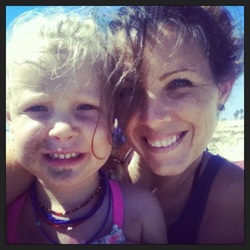 It's almost time. The days are running out. Literally. We have been running around like chickens with their heads cut off trying to get all of our last minute things done. Things like spending hours lounging in the sun at the beach, staying up late listening to friends play the guitar, night swimming and hot tubbing, learning to surf, you know, only the important stuff. I feel like I should have had plenty of time to finish all of these "important" things, but I know there are still a million and one things I would have loved to do during our 3 1/2 months stateside and people I haven't seen and places I haven't gone. It's been an amazing trip, full of good conversation, good connections, good refreshment, and good encouragement. I hope we have blessed others as much as we have been blessed, but part of me feels like that's impossible. We have just been so incredibly blessed. 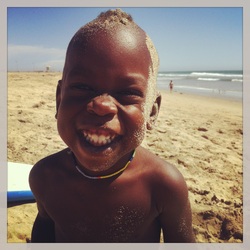 We go back to Karamoja feeling the weight of the prayers behind us. What a blessing it has been to be able to share stories of how God is moving in Uganda and to visibly see the way it moves people's hearts to pray for more. We go back with difficulty as well. Leaving the friends and family that we love is never easy, even if it seems like we move from place to place so effortlessly. There are always tears at night from little ones (and big ones) who love their friends dearly and hate to leave them again. But He is faithful. We have so much to look forward to in the next year. Two new teammates will be coming to join us in Kaceri (hopefully three before the end of the year!) to help with the many projects and outreach activities we are involved in. We have team after team after team lined up, some, good friends coming to see where we live and work, others, almost-strangers that God has put in our paths who have a similar heart and vision to reach the Karimojong with the gospel. We are so excited to get back to our home and our people! During our time here we lost a very special lady that we loved dearly in Karamoja. Her story is one that has shaped my understanding of God in ways I can't even express in words. You may have read her story here. Losing her reminded me again that our next year needs to be intentional. Not that we aren't, but it's so easy to let other good things push out time for the most important thing, sharing the good news and making disciples. I am so thankful that she heard the gospel, through words and actions, and believed in God's goodness and love for her. I pray that Jesus Himself welcomed her into paradise. For those of you who are praying, please remember us in the next few weeks as we pack, fly, and resettle back into our home in Karamoja. Our kids are VERY excited about going back, but transition can also be tough on the little guys. Us big guys also tend to stress just a wee bit as it gets down to the last minute, and we need prayer for even tempers and stable moods :)
God has blessed us beyond words with the friends and family that we have. If you have helped to host our family or feed us or clothe us or just took the time to listen to our stories, we are so grateful for you. During this whole trip we have felt God's hand on our lives in a remarkable way through our community here in the US. Thank you for going out of your way to love on our family. You have truly been to us the hands and feet of Christ. I'll write again soon from Karamoja! (If you are not on our newsletter list but would like to be, please fill out the contact form on this website. We are hoping to send out monthly newsletter updates from Uganda as well as updating this blog as often as possible, but internet is a bit slower in Karamoja land!) 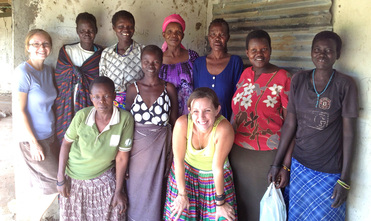 Our Akiru ladies Our Akiru ladies (Excerpt from our Akiru website) She was just another woman at my gate, tired, thin, and hungry looking. "Help me," she begged, handing me her medical records. "I'm hungry. My son is hungry." She motions to the child hiding behind her skirts, his belly protruding from his too-small shirt. "I've been sick and haven't had the strength to work for three days. Can you give me food?" I hesitate, my hand on the gate. Another woman, another decision. I look down at her worn medical book, the pages full of a history of illness. There it is again, those letters I see almost daily since moving here: HIV+ And the child? Also positive. I glance up and our eyes meet. What can I do? A plan has been in the works for several weeks. A plan that we believe is God-orchestrated to help women just like this one. But it seems too soon...I don't feel prepared. Yet here she is. And she is hungry and sick now. Prepared or not, she must be the first. I open the gate wide and usher her inside. Her name is Adoc, and she continues to be the most obstinate and fiery of our Akiru women. Since that first day, Adoc has been a faithful and hard worker with Akiru. Throughout our many experiments and growing pains she has bloomed and flourished. What for me was a random encounter with a needy woman was, according to her, "God's plan". "God led me to your gate that day, no one told me where to go. God used you to give me work and to help me take care of my son. Now I know that God loves me and cares for me." Akiru exists because we believe that God loves the hurting. He is a "stronghold for the oppressed" (Psalm 8:9), a "helper of the fatherless" (Psalm 11:14), and He "does not forget the cry of the afflicted" (Psalm 8:12). This small business initiative is an effort to create income for the most vulnerable women in our community, including widows, those living with HIV, disabilities, and addictions. We know that no amount of money can fix our problems, and so the heart of Akiru is to lead women into a deep relationship with Jesus. In doing so we hope to create among our women a subculture of love, self-sacrifice, honesty, loyalty, and hard work. We believe that God is interested in all areas of our lives, and strive to model and teach life skills such as financial planning and household management as well as character development through Bible study. Just as we who live in Karamoja, Uganda, pray for much needed Akiru or rain for our crops, we pray for God's spirit to be poured out like rain on the women we live and work among. ***** 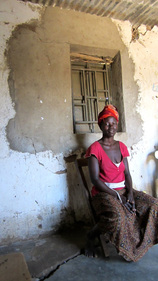 Ayo, one of our journal makers Ayo, one of our journal makers Life in Karamoja is just plain tough on women. They work almost from the time they can walk until they are laid in the ground to finally rest in peace. Their husbands often leave them, either by death or desertion, and they are left to care for their families alone. Even if a husband exists he is not always helpful or hard working. It is common to find women working and men sleeping under the trees. They don't complain much, it's just their lot in life. It's a little different than we Americans are used to, and I struggle with the injustice of it all. My heart is moved with compassion for these women. It aches with them as they bury their babies and struggle through malaria and typhoid. I long to be able to bring lasting change to their difficult lives. But I believe that slowly, day by day, change is coming. It will take time and prayer and long hours and lots of wisdom, but it's coming. 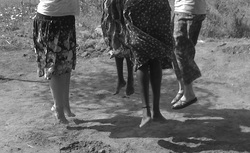 Dancing after our weekly meeting Dancing after our weekly meeting Please join with us in bringing this change. Go to our Akiru site to see our handmade journals and learn more, or go straight to our etsy story and buy one today! All profits go to paying our women's salaries and buying supplies. If you are interested in selling Akiru journals in your store, business, or your church, please contact me! For those of you who can handle the length, here is a link to the message Kenneth shared at Williams Boulevard Baptist Church in New Orleans, LA. This story never fails to move me as I hear it, even though I was there. Please take the time to listen! 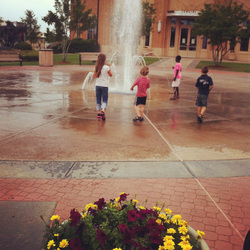 Greetings from America! I am writing this in an air conditioned room in a comfortable chair listening to the sounds of basketball on TV. I ate fish, couscous, and corn on the cob for dinner and made blueberry muffins for breakfast yesterday. Yum. Life is good. America has truly been a land of opportunity for my kids so far as well, and they are taking full advantage of all it has to offer. They are amazed by the simplest things: - ice, everywhere and in everything - free (and safe) drinking water - fountains everywhere! America seems full of water to a family from the parched regions of Uganda. - strawberries, grapes, and peaches 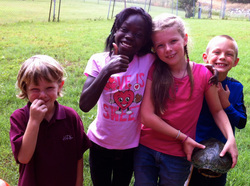 - squirrels! Believe it or not, this has been one of their favorite things to see. They chase them almost every time they see one! - different kinds of dogs. Vaeh actually chased a lady down in order to pet her poodle! That girl is born to be a vet :) - air conditioning. Ok, this one is NOT a favorite of any of them. They prefer open windows all the time and can't understand why people are always inside! - seat belts. No more climbing around the car while we drive. Another non-favorite. - "the thing that makes things hot" aka the microwave :) Most of our days so far have been full and fun. Trips to the museum, dinner and playtime with friends, trail running through the woods, visiting various churches, playgrounds, yard and garage work, bar-b-ques and tractor rides, and the local "castle", aka arcade, have balanced out our school hours. We have also started a new school curriculum and are slowly changing the way we "do" school. This has been a challenge, but I am hoping we will get the hang of it by the time we go back to Uganda. This last year of teaching has been tough on me (and probably them!) so I am excited for the change. Hopefully it will breathe new life into my teaching and their learning. All of the kids have done really well with the transition to America. Selah is making friends everywhere she goes while Acuka tries, in his own way, to get his point across. He has fully entered the terrible twos, but at least he's so cute that you just have to forgive him :) My kids are continuing to do daily chores, some of them a bit different than they're used to, but they continue to be helpful and obedient. For some reason I thought America would ruin them. 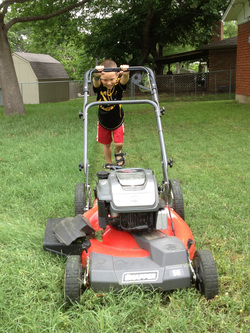 They are so innocent and sweet in so many ways. They spend their days in Karamoja climbing trees and mountains, playing football and jump rope, and practicing with their slingshots or bows and arrows. Such a simple, lovely life. I view America as the insidious evil (to steal a phrase from Andy) that can rob them of their innocence. And maybe that's true in some ways. I had forgotten a lot of things about America. Things that make us all wince and turn our thoughts back to our friends struggling right now in Karamoja. Things like the way we live to eat instead of eating to live. Things like throwing away food. Any food. Period. Things like disposable plates, cups, forks and spoons. Things like "processed foods". We can't see the people begging for food and so we get all we can, can all we get, and sit on the rest. We can't see kids like little Nacuk pick up a potato I dropped in the sand and brush it off and pop it in her mouth, not willing to waste even a bite. We can't see the children that climb through my "trash pit" looking for treasures I might have thrown out. Sometimes they even scour my compost heap, claiming rotten potatoes and onion tops for their family's dinner. We can't see these things and so we forget to be careful with what we've been given. And we've been given a lot. I have been here for two weeks and am already forgetting. It's so easy to forget. 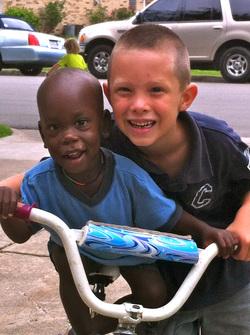 We are blessed. We are blessed with an abundance of food. We are blessed with riches, more "stuff" than we know what to do with. We are blessed with comfortable homes, cars, beds, even chairs. We are blessed with good, free education. We are blessed with knowledge of the world at our fingertips. The list goes on and on... We are so blessed to live in this country. And yet we live such divided lives. In the whole week we stayed in Texas we were the only family outside. My mom's yard was littered with toys, and I was always missing at least one kid who had gone bike riding or exploring in the creek. And although you might worry about that, my missing children, there is no need because we never saw any people. Now and then you would see someone coming home from work, or there's that one neighbor who likes to sit for hours on end on his front porch, shirtless, but otherwise, no one. Not a soul. And although I am happy for the break and enjoying visiting people, this place, no matter how comfortable, can be awfully lonely. (Is it just me or do you all feel the same way??) 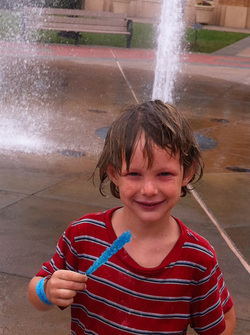 So thank you to those of you who have made us feel at home in this home away from home (and even in south Uganda as we finished paperwork for leaving). You have blessed us more than you know. Thank you for inviting us over for dinner, picking us up from the airport, fixing us delicious meals, giving us a place to stay, letting us do laundry at your house, jumping on the trampoline with us, running with us, sleeping on the couch so that we could have your bed, hosting bar-b-ques in our honor, babysitting for us, allowing us to speak to your churches and Sunday School classes, giving us money and food, and reminding us that we are not alone. Thank you for reminding me of the best thing about America, the people. And because you are such good people I know you will try, as I do, to remember how much we've been given. To show your thankfulness by making economical decisions regarding food, money, and time. To try your best to be a friend to the lonely and hurting around you. To invite them into your homes and your families and love them as you've loved us. Thank you for being the hands and feet of Christ to us. We are so grateful and so blessed to call you friends. I hope to see many more of you in the months to come! (A special THANK YOU to Hackers for Charity in Jinja, Uganda, for the free housing during our adoption process! You guys were a huge blessing to our family!) 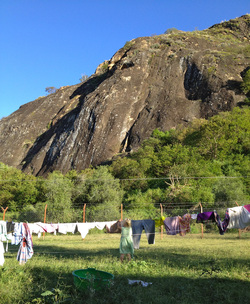 Tomorrow we leave Uganda for the first time in three years. I looked through my pictures for something with our house or yard, but almost every recent one is from Kampala of all places. Shows how much time we've spent at home lately. It's been a full and sometimes crazy last few months. We've been back and forth and back and forth again to Kampala, trying to finish paperwork, get passports and apply for visas. My emotions have ranged from bored (from waiting) to anxious to busy to exhausted (is that an emotion?) to excited to sad. Everything is bittersweet. I keep reminding my children that we are coming back, this is just a visit, but it's still hard to leave. My journal entry sums up the pull Africa has on a person, "I feel like a milk bush that has been uprooted and stuffed down deep into the soil of Africa. Nothing to hold me but somehow I grow until I am firmly rooted, tied to this land and thriving." This place gets in your blood. I asked Zion the other day if he thought he would move back to America someday. "No, Mama, Karamoja is my home!" with firm conviction in his voice. "Well, do you think you will marry a Karimojong girl then and stay here forever?" I ask him, very amused. "No, I'm going to marry a Chinese girl! They are the prettiest," he says with a big smile, "and then we'll move back to Karamoja!" Well, I'm glad to know he has a plan :) Despite our reluctance to leave our home here, we are VERY excited to be coming for a visit and hope to see many of you, our friends and family. We will also be sharing about what God is doing in Karamoja at churches around the country. If you are interested in hearing our stories or meeting up with us send us an email at williamsinthewilderness@gmail.com. Thank you for praying for us over the last few months. God has been faithful to answer ALL of our prayers in bigger ways than we ever thought possible. We are so blessed. |
Would you consider partnering with us financially to serve Liberia?Kenneth and Kristi Williams The Williams Family
Kenneth and Kristi
Nevaeh, 20 years old
Rikot, 20 years old
Ezra, 19 years old
Zion, 18 years old
Izzy, 16 years old
Selah, 13 years old
Acuka, 13 years old
Benaiah, 9 years old
Jubal, 6 years old
Jireh, 3 years old
Blog archives
April 2024
Categories |
